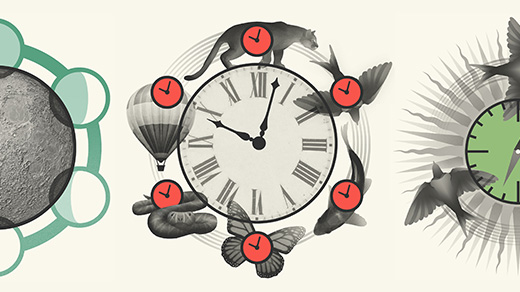What's up in
Time
Latest Articles
What Is the Nature of Time?
Time is all around us: in the language we use, in the memories we revisit and in our predictions of the future. But what exactly is it? The physicist and Nobel laureate Frank Wilczek joins Steve Strogatz to discuss the fundamental hallmarks of time.
How Quantum Physicists ‘Flipped Time’ (and How They Didn’t)
Two teams have made photons act as if time were simultaneously flowing in two directions. The experiments demonstrate a way to potentially boost the performance of quantum devices.
How to Think About Relativity
Albert Einstein’s ideas about space-time aren’t exactly intuitive, and they aren’t exactly Einstein’s, either.
Physicists Rewrite the Fundamental Law That Leads to Disorder
The second law of thermodynamics is among the most sacred in all of science, but it has always rested on 19th century arguments about probability. New arguments trace its true source to the flows of quantum information.
An Ultra-Precise Clock Links the Quantum World With Gravity
Time was found to flow differently between the top and bottom of a single cloud of atoms. Physicists hope that such a system will one day help them combine quantum mechanics and Einstein’s theory of gravity.
The New Thermodynamic Understanding of Clocks
Investigations of the simplest possible clocks have revealed their fundamental limitations — as well as insights into the nature of time itself.
The Year in Physics
Featuring paradoxical black holes, room-temperature superconductors and a new escape from the prison of time.
Reasons Revealed for the Brain’s Elastic Sense of Time
New research finds that the subjective experience of time is linked to learning, thwarted expectations and neural fatigue.
Arrows of Time
The human mind has long grappled with the elusive nature of time: what it is, how to record it, how it regulates life, and whether it exists as a fundamental building block of the universe.








